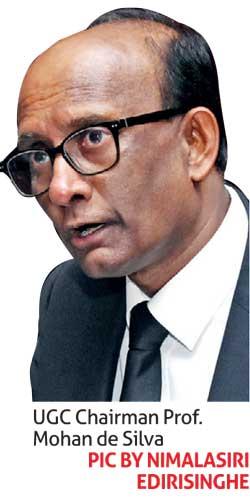01 Nov 2019 - {{hitsCtrl.values.hits}}
By Nishel Fernando
Unless Sri Lanka’s universities move away from the conventional State funding system to a sustainable financing model opening up to competition, the country’s higher education is doomed to fail, according to the head of University Grants Commission (UGC).

“UGC strongly feel that present finance system to state universities is not clearly sustainable. In the present day, the society expects the universities to produce able graduates and of course able graduates must be employable. In a competitive society in which we live today, universities too must be ready for competition for growth,” UGC Chairman Prof. Mohan de Silva said.
He quipped that while shying away from competition, Sri Lanka’s universities continue to portray themselves as knowledge creators and knowledge givers, which might have been justified philosophically in 19th and 20th centuries.
Prof. de Silva emphasised that key reforms are essential for the State-funded universities to become competitive.
“The universities are hampered entering into competition due to present University Act and UGC regulations. Therefore, the UGC strongly feels that universities must be provided
with more autonomy.
“The academic and non-academic staff should be given special category status with perform-based pay structure and performance appraisal systems. They must be made accountable for what they do,” he elaborated.
In a concept paper to the government, the UGC led by Prof. de Silva, has recommended several key reforms to the current university system to serve the needs of the modern day society.
The main objective of the concept paper is to connect Sri Lanka’s universities with funding with an emphasis on greater autonomy to universities.
“Student satisfactory surveys regarding quality and learning activities, research and development activities, intellectual property activities and presence of safe and conducive learning environment for students must be linked to funding.
“The faculty should be given greater autonomy to initiate supplementary academic activities including income generating trajectories. The Universities should be empowered to recruit international students on a continuous basis,” Prof. de Silva said sharing some of the key recommendations of the concept paper.
He also proposed that the universities should receive State-funding based on student intakes and performance
of the university. Moving forward, he stressed that Sri Lanka cannot continue to hang on to popular slogans such as six percent of GDP allocation for education without specifying any reforms.
“Unless we move away from conventional funding system, Sri Lankan higher education system in our opinion is doomed to fail,” he cautioned.
15 Nov 2024 5 minute ago
15 Nov 2024 27 minute ago
15 Nov 2024 56 minute ago
15 Nov 2024 57 minute ago
15 Nov 2024 1 hours ago